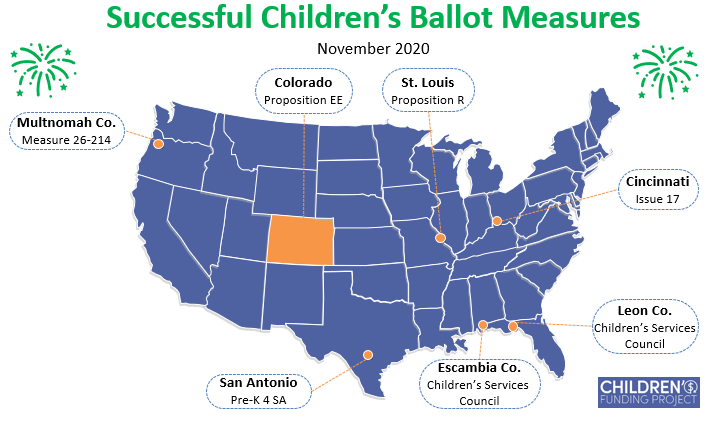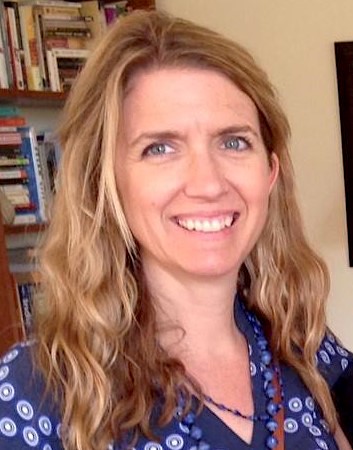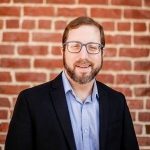On November 3rd, seven early childhood ballot initiatives went before voters in cities and counties around the nation. All seven passed. The Children’s Funding Project is a nonprofit organization that supported these measures; the organization’s mission is “to help communities close equity & opportunity gaps for children and youth by effectively leveraging existing funding, generating new revenue and developing collaborative infrastructure to administer funds in a coordinated fashion.”
To get a better idea of what happened, and what lessons can be learned from the election, I interviewed Elizabeth Gaines, founder and director of the Children’s Funding Project. What follows is a lightly edited transcript of our conversation.

Elliot Haspel: You’ve talked about how there wasn’t necessarily a blue wave or red wave in this election, but there was a ‘children’s wave.’ What do you mean by that?

Elizabeth Gaines: The Children’s Funding Project and our 501(c)(4) arm, the Children’s Funding Accelerator, supported these seven measures that were on the ballot around the country. They were in places as diverse as Escambia County, Florida – which is basically Alabama – all the way to Multnomah County (Portland), Oregon, which is about as far left as you can get. So I’ve been saying ‘from Pensacola to Portland!’ we saw voters show up and say they were willing to pay a little bit more in taxes to support their community’s children.
I’ve been thinking about the fact that the election showed this country is still so divided, and we have a lot more time before everyone sees the ideas of equity and opportunity for all kids being the central things. So we need to continue to build on this new – not so new anymore – localism concept, and build models where we can, so that when states start to become ready, when finally the federal government starts to becomes ready, we actually have good, solid models of what it looks like for a community to invest in their kids and do so in a progressive taxing way. [Note: Gaines’ use of ‘progressive’ isn’t in the political connotation but rather in the economic connotation; a progressive tax sees the tax burden increase as income increases, as opposed to a regressive tax which disproportionately impacts poorer taxpayers.]
HASPEL: Are there particular lessons from these campaigns other communities can learn from?
GAINES: Most of the communities we supported were contending with a natural disaster – not just COVID but hurricanes, fires. And people were telling us ‘oh, it’s not the right time.’ And they all won with more of the vote than similar measures have gotten in the past. It was exactly the right time. So that was a lesson.
GAINES: I do think COVID, and the need for something positive to vote for was a factor. The people who were running these campaigns did a fabulous job; they learned from what happened before, took advice, didn’t rely only on polling to tell them whether to keep going hard or not. Sometimes if there are good poll numbers, people feel like they don’t have to leave it all on the field. But probably more the former than anything else.
HASPEL: So then that makes me curious: in 2022, 2024, when, knock on wood, we’re not in the middle of a pandemic anymore, what lessons from 2020 can be applied forward?
GAINES: That’s one of the things I’m really focused on doing now – staying with these places, so that we can track their implementation. There are also a lot of places like San Antonio, specific Florida counties, San Francisco, that have really good data on how they’ve been able to improve the odds for kids. So making sure we’re telling the story from these places in a really compelling way. Also, we need to get more national funders to pitch in to these campaigns, because some of them did have opposition and money matters in these campaigns.
HASPEL: One thing that struck me looking around the map is that there are lots of different funding approaches – property taxes, income taxes, tobacco/vaping taxes, and so on. How do communities go about choosing what approach to go after?
GAINES: Well in some places, there are really slim pickings. They have to just go with what they have the ability to do at the city or county level because state laws differ; not every community is able to do what Multnomah Co. just did with their high-earner income tax.
We are looking at how can you get enabling legislation to create these ‘children’s districts’ at the local level and use more progressive taxation? We want to assist communities to work with local tax experts and figure out what’s allowed under the charter, under state law, and find as fair an option as you can find. If not, we’re pragmatic and we’ll support it, but we’re not going to encourage the unimaginative use of sales tax (a regressive option) as the only path.
HASPEL: You mentioned that localities are having to pave the way while states and the federal government figure it out. So what lessons do you hope state and federal lawmakers are drawing from these local victories?
GAINES: One, that people don’t actually mind paying taxes when it’s for something good and new that they know their community needs. Two, that your community actually does better when you have a thriving place for families to raise their kids. Those are the main lessons!
HASPEL: When you think about the campaigns themselves, even though the funding mechanisms were different, to what extent were the campaigns similar or different?
And I say it should go for whatever people are willing to have it go for right now, and early childhood seems to be winnable. So, again, being pragmatic, yes there are many important issues, but voters are willing to do this right now, so let’s get it.
Then there’s a question of what to respond to or not to respond to when it comes to social media, and I saw groups choose to respond in different ways.
HASPEL: One thing that’s interesting about early childhood is that there are lots of different constituencies, some of which you just pulled out – practitioners, parents, government leaders, business. It feels like there’s been a swell particularly around parents, as COVID shines a light on early care and education. Have you seen parents more engaged than in the past?
GAINES: I do think that it feels like there’s more of a closeness to what people are experiencing, though I have no data; maybe parents just have it more on their mind so they’re paying more attention to the political dialogue around these measures. Even here in D.C. where I live, where they passed ‘birth-to-3’ legislation and just elected a new slate of city council people, so many candidates on the voter guide led with ‘as a parent…’
HASPEL: That makes sense! Anything else you want to share?
GAINES: These results are just for me a reinforcement of this localism piece. People sometimes challenge me on it – ‘shouldn’t we go for the big federal dollars’? Yes! And yes, we should also go after the state dollars. But if we don’t play the long game, in the way others have done in other issue areas, we’re just going to continue to be behind.
Related Reading:
Article: Like a Dream Become Reality: Multnomah’s Preschool for All Efforts Showcases Parent Power
Article: Early Childhood Alliance Onondaga, NY: A Master Class in Cross-Sector Coalition Building
Article: Kent County, MI: Business Community is Key to Galvanizing Support for Early Childhood Services
Video: Helping Business Leaders Back Early Learning Initiatives: JD Chesloff




